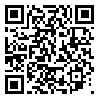BibTeX | RIS | EndNote | Medlars | ProCite | Reference Manager | RefWorks
Send citation to:
URL: http://jdm.tums.ac.ir/article-1-356-en.html
Statement of Problem: In the treatment of edentulous patients with implant supported fixed partial dentures several factors such as implant numbers, implant position, superstructure pattern and cantilever length must be considered. Mandibular flexture in function exerts forces in peri-implant bone, however this phenomenon has received little attention.
Purpose: The goal of this finite element analysis (FEA) study was to evaluate the effect of mandibular dimensional changes on peri-implant bone stress in different prosthesis and implant treatment plans.
Materials and Methods: In this experimental study, three dimensional finite element computer model of mandible was simulated according to data from CT-Scan in 0.5 mm sections. The model of 4.110 mm ITI implant, measured by profile projector, was simulated in solid works 2003 software. Implant models were inserted, in two different patterns, on mandible and three different superstructures were placed on implants. Two clenching tasks were modeled (incisal clench and right molar clench).
Results: Analysis of Von Misses stress for peri-implant bone revealed the lowest stress values in three-piece superstructure.
Conclusion: According to this study, additional placement of implants in order to fabricate independent prostheses and to achieve the freedom of mandibular flexture are recommended.
| Rights and Permissions | |
 |
This work is licensed under a Creative Commons Attribution-NonCommercial 4.0 International License. |




